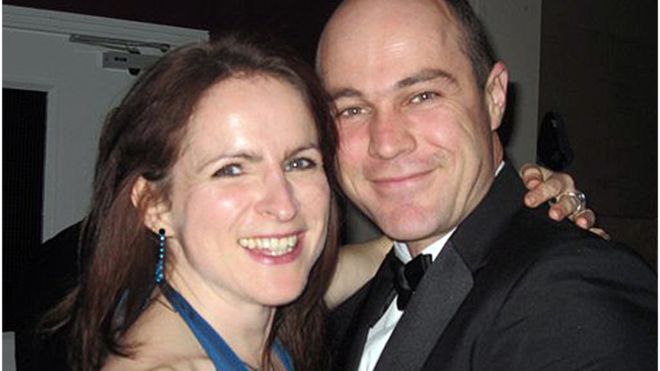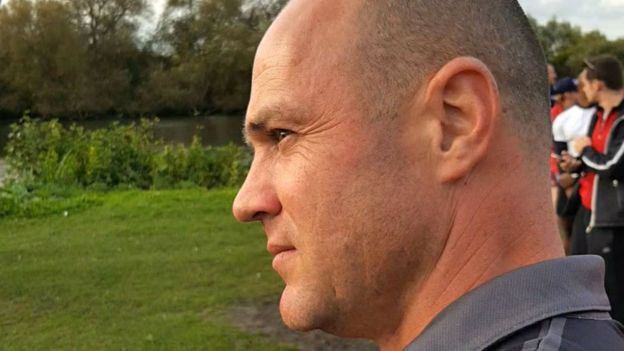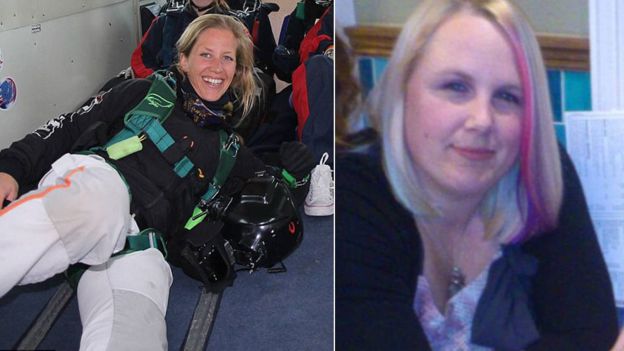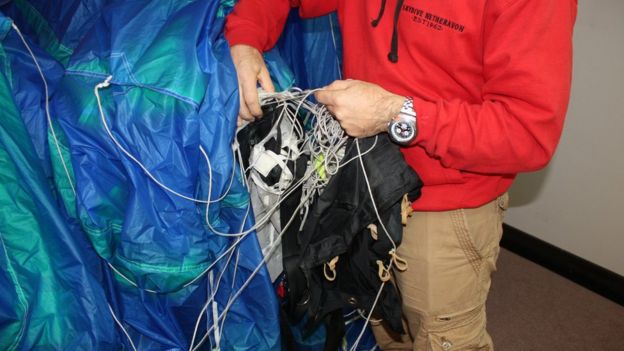
An Army sergeant has been found guilty of trying to murder his wife by tampering with her parachute. Victoria Cilliers, 41, survived the 4,000ft (1,220m) fall at Netheravon airfield in Wiltshire in April 2015.
Sex, lies and payday loans: The parachute murder plot
A soldier has been found guilty of trying to murder his wife by sabotaging her parachute. This is the story of how Emile Cilliers’ lifetime of deceit ultimately led to his unveiling as a would-be killer. As Sgt Emile Cilliers drove home on the afternoon of 30 March 2015, he knew his plan to kill his wife Victoria by causing a gas leak had not worked. So he pulled out his new iPhone – bought with his wife’s money – and sent her a text. The wheels were once again set in motion. Surely nobody could survive what he’d planned for his wife next? He wasn’t to know that as Victoria Cilliers plummeted to earth after a catastrophic parachute failure, his own life would steadily unravel.

Cilliers had hoped to kill his wife in their own home. He’d done all the preparation: opening the gas valve in the kitchen before heading off to his ex-wife and current lover Carly’s house, safe in the knowledge his toddler, newborn baby and exhausted wife were tucked up in bed. Once his tryst with Carly was over, he sent a saucy text or two to his girlfriend Stefanie, checked an adult website “for thrills” and drove the 45 minutes to his barracks in Aldershot.
The following morning, Victoria Cilliers woke and went to the kitchen to fetch some milk for one of her children. She smelled gas. She texted her husband, asking if he’d altered the valve in the kitchen as there was blood around it.
“Are you trying to bump me off?” she joked. And of course he was.
Things weren’t rosy in the Cilliers marriage, but Victoria was unaware of most of what was going on behind her back. She was a woman in love. But although Victoria was suspicious of Emile’s fidelity, she would never have suspected he’d attempt to take her life not once, but twice. But Emile Cilliers was a man used to getting his own way. When he wanted money, he borrowed large sums from his wife, colleagues and payday loan companies. When he wanted sex, he used prostitutes, had casual flings, and had affairs with his ex-wife and a girlfriend who lived abroad. When he wanted to go on holiday with that girlfriend, he told his wife it was a work trip. And when he wanted Victoria out of his life, he tried to kill her.

Image copyrightFACEBOOK/TWITTER Emile Cilliers had a relationship with Stefanie Goller (left) and continued to sleep with his ex-wife Carly Cilliers
A sergeant in the Royal Army Physical Training Corps, Cilliers frequently volunteered for residential training camps abroad – even when Victoria was heavily pregnant. He also started to stay overnight at his barracks in Aldershot, complaining about the 45-minute commute from his home in Amesbury, Wiltshire. Victoria was worried he was becoming cold towards her and she was terrified of him walking out on her and the children. As Cilliers, a father of six, grew ever more distant, Victoria clung all the tighter. She sent texts and emails to her husband when he was away from home, saying she loved and missed him. She voiced fears that he had fallen out of love with her, or that he was seeing someone else.
“I feel like a failure as a wife,” she said to him in one tragic text message.
She had psychological scars from the infidelity of her first husband, a vulnerability Cilliers was quick to exploit. He blamed her suspicions about his behaviour on her previous experience, describing her as “emotional”. At the same time, he told her he needed time to think.
“I need to decide whether I want to be in this marriage,” he said, while in Austria skiing with the Army. “I think we may have got married too soon.”
Victoria, who was shortly due to give birth to their second child, cried so hard she “thought it might harm the baby”. She had no idea Cilliers was already planning a life with a new woman. He also had debts that were spiralling out of control. Over the seven years they had been together, Victoria had subbed him more than £19,000 with the idea he would pay her back with a regular standing order. Sometimes he did; more often he did not. As Victoria was worried that she and her husband were growing apart, she was gratified to receive a text from him suggesting they jump together over the Easter weekend. After all, he had not even bothered to text her over the new year when he was abroad. Victoria thought it was a work trip. Her husband was actually enjoying himself in Berlin with Stefanie.
At home, Victoria was dealing with the ramifications of his rampant spending and borrowing. A bailiff from a payday loan company had been to their home. Alone, pregnant and looking after a toddler, she felt intimidated and afraid. She sent her husband a text about it.
He replied: “Why are you worried? They can’t do anything.”
He had taken out several high-interest loans with payday loan companies. He asked friends for money, promising to pay it back. He transferred three lots of £2,000 from Victoria’s saving account to his own, without her knowledge. When she noticed the transactions, Cilliers told her that her account had been hacked. When the bank investigated this apparent fraud, it found that the internet provider address was the family’s home computer.
But, on that day just before Easter 2015, when Emile suggested the jump, Victoria was delighted he seemed to want to not only do something fun, but do it together. They went to Netheravon airfield on the Saturday, but bad weather prevented them from jumping. Cilliers had collected a parachute rig from the kit store for Victoria. Before heading home, rather than return Victoria’s rig to the store, Cilliers put it in their locker. He said it was so Victoria could save time the following morning. She felt uneasy. She would not ordinarily put kit that did not belong to her in their locker, but she acquiesced. It was preferable to squabbling over something minor, especially when they’d been getting on so well. In reality, her husband had taken the equipment into the toilet and sabotaged both chutes. He twisted the lines on the main one and then removed parts of the reserve. He had to keep her kit separate or someone else would be his victim.
Victoria returned to the airfield on Easter Sunday. She texted her husband to say she was tempted to go home and “eat her choc egg” as the weather was poor again, but he encouraged her to stay until jumping conditions improved. All of a sudden he was putting her first. He was looking after their children while she enjoyed a hobby she said was “her life” before she married and had children. So she put on the parachute rig and went up in the plane to the cloud layer – about 4,000ft (1,200m).
Witnesses told the court she was happy and excited to be jumping again. She fist-bumped other skydivers in the aircraft with her. She was the last to jump. She stepped out of the aircraft, free fell for about three seconds and then pulled the cord. Immediately, she knew there was something wrong.
“It just didn’t feel right. The lines were twisted. I was spinning.”

Image copyrightWILTSHIRE POLICE Victoria Cilliers’ parachute was shown to the jury
Victoria had completed more than 2,500 jumps. She knew what to do, so cut away the main chute and deployed the reserve. It did not work. That was the last thing she remembered. Airfield ground staff watched in horror as she spiralled to the ground. She looked “like a rag doll”, being flung about underneath a malformed canopy. They were so certain she had died they took a body bag to collect her. Her survival was described by experts as “a miracle” and was put down to her small size and the fact she landed on a soft, recently-ploughed field. She suffered a broken spine, a smashed pelvis, fractured ribs and internal injuries.
It is unusual for a main parachute to fail, and almost unheard of for the reserve to do so as well. In fact, no equipment anywhere in the world had ever failed in this particular way, experts told the trial.
The British Parachute Association inspected the chutes and concluded they had been deliberately sabotaged. Apparently, someone wanted Victoria dead. The investigation was passed to the police. It was perhaps poetic justice that it was Emile’s infidelity that unravelled the case.
Phone and computer records were seized and texts sent by Emile to his girlfriend Stefanie Goller were found. He had told her he wanted to marry her. They had planned holidays together, browsed the internet for houses, and he had promised her the world. The police had something to go on. Details of his financial affairs also emerged, his reliance on payday loan after payday loan. He believed that getting rid of Victoria would solve both problems.
Described by the prosecution at his trial as a “pathological liar who is completely devoid of empathy”, Cilliers had hoped to receive a substantial payout from Victoria’s life insurance. But, aware of what she described as her husband’s “financial incontinence”, she had changed her will to ensure her assets went to her children.
After the parachute jump, Victoria, now aged 41, was in intensive care when her husband turned up at her bedside. Rather than offer his support or sympathy, he produced critical injury insurance forms to be signed by a doctor. “He didn’t even say he loved me,” Victoria told the police. “He was there counting up my fractures. You get £1,000 for each break and he was there totting them up.”
He was also texting Stefanie while next to his wife’s hospital bed. In his first interview with the police, Cilliers cried about the situation with “love of his life” Stefanie, worrying they would break up. In his second, she was “just an affair”. By the third interview, when police asked him about his earlier tears, he said it was because he had been worried about Victoria. The officer pointed out it was the other woman he had been crying about. By the time the case came to trial, he said he had been “stringing Stef along”.
Emile Cilliers had grown up in South Africa with his parents and a younger brother and sister. He worked his way up his father’s construction company to the position of foreman. When he moved to the UK in 2000 he left behind two young children, a boy and a girl, with their South African mother, Nicolene. He was working in a bar in Oxford when he met a woman called Carly Taylor, whom he was eventually to marry. They parted after a few years yet remained on more-than-amicable terms. She lived about five minutes away from Cilliers’ home with Victoria. Having a wife, a girlfriend and an ex-wife all willing to sleep with him was not enough for Cilliers, who also met women for casual sex and arranged sessions with prostitutes. Days after the baby was born to Victoria, he got in touch with a former flame and planned to go away for the weekend with her.
“I’m a very sexual man,” he announced to the jury.
Emile Cilliers has always been a man who cannot distinguish between “want” and “need”. Despite his debts, he would splash out on skiing equipment, golf clubs and gadgets. After he was arrested for attempted murder, he received some insurance money to spend on essentials because he was living in a room at his barracks and his bail conditions prevented him from returning to the family home. He spent it on computer games, a PlayStation and an iPhone. At his trial, he told the jury that he “needed” sex and female company. This was his reason for contacting Stefanie Goller via a dating app when he was in Austria skiing with the Army at the end of 2014. Victoria, heavily pregnant, was at home. Stefanie, an Austrian, was living in Innsbruck when she first met up with Cilliers for dinner. He told her he was separated from Victoria and that his wife was expecting another man’s child. He persisted with the lie about the baby’s paternity even after the child was born, falsely claiming to have had a DNA test proving he was not the father, and suggesting people Victoria could have had an affair with. Obviously, she had not been having any sort of illicit relationship. Cilliers told Stefanie: “I held [my baby] and felt no connection.” This was a contrast to the words he used in court, when he said he “felt an immediate rush of love” and “bonded straight away” with the newborn.
Cilliers took Stefanie for expensive meals and holidays to the Czech Republic and Germany. She had no way of knowing that these were treats he could not afford, and were often financed by his unwitting wife. Cilliers had told his girlfriend that he could “do random and spontaneous from April”. He told the court he was referring to the deadline he had set himself for leaving Victoria. It was mere coincidence, he said, that the parachute “accident” was also in April.
Stefanie was smitten. She stayed with him at his room in the Army barracks in Aldershot. They even ate breakfast at the mess with Cilliers’ fellow soldiers, who all assumed he and Victoria were no longer together. In court, the 38-year-old had a confident demeanour. Carrying himself with military bearing, in the witness box he spoke of his fondness for cricket. He did not stint when it came to smart dress. He would wear not just a suit, but a waistcoat and ostentatious belt, a gold tie clip, shiny cufflinks. When someone mentioned in his hearing that it was proper for a gentleman’s waistcoat be undone on the final button – which his hadn’t been before – he appeared to take it on board and from then on it was unbuttoned. According to the prosecution barrister, Michael Bowes QC, much of Cilliers’ behaviour was “learnt” rather than genuine. Elizabeth Marsh QC, Cilliers’ defence barrister, told the jury that he “did not change in any way” after Victoria’s fall. “He was not stressed or sweaty. He didn’t start to act in a panicked or guilty manner,” she said. When giving evidence he refused to be provoked. In a flat tone he replied to cross-examination with “that’s your perception” and “it’s not up to me to prove that”.
A lecturer in psychopathy who was watching the case from the public gallery said Cilliers displayed “all the signs” of a psychopath. “His interest in risky sports, his complete lack of remorse [for his infidelity], his excessive spending, his womanising, and his inability to empathise are all on the prescribed list of psychopathic behaviour,” she said. “If the gas didn’t work and the parachute didn’t work, he would have had another go and another go until it was successful.”
Perhaps tellingly, Cilliers often mentioned in text messages marrying Ms Goller and proposing to her – but not once did he mention a divorce from Victoria.
Mr Bowes described the “callousness” Cilliers showed: “He texts his mistress while at the side of his seriously injured wife, saying: ‘I can’t imagine anything like that happening to you; all I can think about is you’.” Cilliers’ defence was simple – he maintained to the end that he hadn’t tried to kill his wife. If the parachute had been sabotaged, it wasn’t by him. If the gas tap was deliberately opened, he wasn’t the one who did it.
When the prosecution put it to him that the only alternative to his guilt was that a “random stranger” had broken into his house and opened the gas pipe and then tampered with the parachutes, he agreed. The jury, however, did not. Victoria Cilliers was not just her husband’s victim of attempted murder. He took her money and her trust. He denied his paternity and his obligations. He put himself first to the extent he would have quietly and efficiently killed her, and endangered the lives of her children. Against him, Victoria Cilliers barely stood a chance.
Source www.bbc.co.uk





Be the first to comment